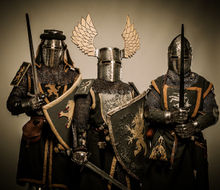Barones
Barones - latin for Baron
Baron - Liber Baro, Barones Regni. The word baron comes from the Old French baron, from a Late Latin baro "man; servant, soldier, mercenary" (so used in Salic Law; Alemannic Law has barus in the same sense). Isidore in the 7th century thought the word was from Greek βαρύς "heavy" (because of the "heavy work" done by mercenaries), but the word baro is of Hispanic barón that presumably origin from word baro of Old Frankish origin, cognate with Old English beorn meaning "warrior, nobleman", "free man". Cornutus in the first century already reports a word barones which he took to be of Gaulish origin.
In Poland and Lithuania during medieval time, the title was refered to higher nobility holding high offices and jurisdiction, representing the King. It include Chamberain (podkomorzy), Lord of Regality (starosta), and Jugdes that acted in the name of the King, having right to judge. It also refere to Castellans and Voivodes but those used often additional title - Comes.
The title of Baron or Liber Baro was also refered to knight families of ancient origin (uradel).
Using the titles become prohibited in Poland in the middle of 17-th century - except few Russian and Lithuania prince titles - families where not allowed to use any title. During the partition time, any family that could document land posession and having ancestors holding offices of Lord of regality and Chamberlain where automatically qualified for the baron title if family accepted foreign authority during the time of partition of the Polish-Lithuanian Commonwealth.
In France during the Ancien Régime, French baronies were very much like Scottish ones. Feudal landholders were entitled to style themselves baron if they were nobles. the title of baron was very common until the reign of Napoleon. Also, similar as in Germany and Poland, the tilte assumed as a titre de courtoisie by many nobles, both members of the Nobles of the Robe and cadets of Nobles of the Sword.
In most, old title of Baron can be translated to english peer or high nobility, in germany Hochadel and also refere to the German title Freiherr which mean Free Lord, Liber Baro.
From being powerful aristocratic title in medieval time and through XVI-XVIII century where the title was both curtesy title and common title for all nobility that reached level of middle class - the title of Barojn become in XVIII century lowest hereditary title of High Nobility (Hochadel).
In the Clan of Ostoja, only one person accepted the title of Baron, it was Czechowicz in Austria. Since Chechowicz died without issue, this line of the family extinct and there are then no "modern" or "foreign" baron titles in the Clan of Ostoja, only the ancient ones - Liber Baro and Barones Regni.
